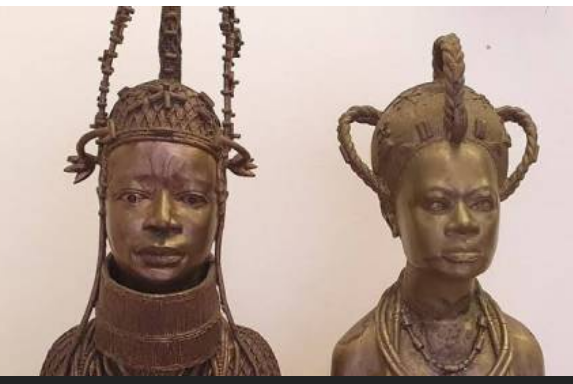The Church of England in the United Kingdom has promised to return two Benin Bronzes to Nigeria as the row over the repatriation of African treasures continues to grow.
Lambeth Palace said it is “currently in discussions” about the return of the works which were given as gifts to then Archbishop of Canterbury Robert Runcie almost 40 years ago.
They are likely to end up at the planned Edo Museum of West African Art which is being built in Benin City specifically to showcase the treasures of the African kingdom which is in present day Nigeria.
Benin was attacked by British troops in 1897 with around 5,000 works of art plundered and spread across the globe which are now being tracked by an online project gathering information about them.
A Lambeth Palace spokeswoman said: “We have recently been contacted by the Digital Benin project at the MARKK (Hamburg) who enquired about our collection of gifts at Lambeth Palace and if we had received any Benin kingdom objects as gifts over the years.
“In response, we have confirmed to the Digital Benin project that we have two bronze busts, given to us by the Benin kingdom in 1982. These were gifted to Archbishop Robert Runcie by His Excellency Chief (Prof.) Ambrose F. Alli and the University of Nigeria, Nuskka.
“We have offered for the two busts to be included in the Digital Benin project and eventually, returned to our friends in Edo, Nigeria where they may remain. We are currently in discussions with the EMOWAA, via the Legacy Restoration Trust, to arrange this.”
The move comes amid growing pressure on institutions to return looted works of arts with the Horniman Museum in Forest Hill – one of the latest to take steps to potentially hand back exhibits.
The museum worked with Nigerian Londoners to develop its policy and says it is open to the “possible return” of objects “acquired at different times and under a range of circumstances, some of which would not be appropriate today, such as through force or other forms of duress”.
The Horniman statement went on to say “We understand that for some communities – whether in countries of origin or in the diaspora — the retention of some specific objects, natural specimens or human remains is experienced as an ongoing hurt or injustice.”
Demands for the restitution of exhibits to their original countries is one of the biggest issues facing London’s major museums.
In 2017, French President Emmanuel Macron said he wanted African artefacts held in French museums to be returned and a report recommended everything taken “without consent” during the French colonial era should be returned permanently.
In 2019, the National Army Museum agreed to return a lock of hair cut from the head of an Ethiopian emperor in its collection.
The hair was taken from the body of Tewodros II who killed himself when the British invaded in 1868, rather than be taken prisoner. It was returned to the Ethiopian government to bury along with the rest of his body.
Source, Saharareporters








